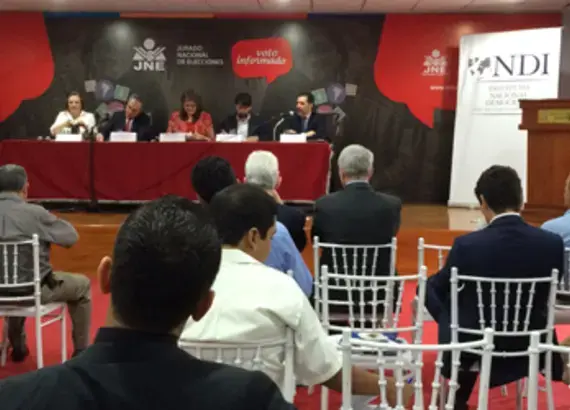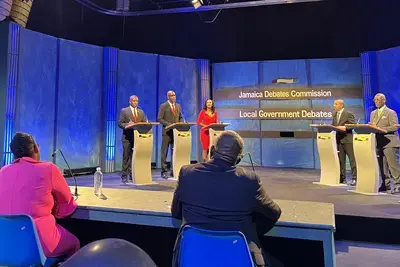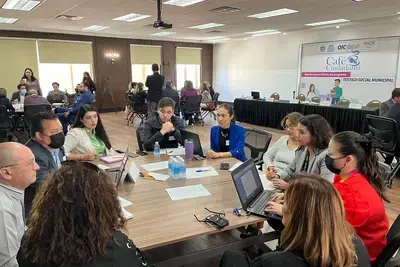
Success Story
Latin American Party Leaders in Lima Identify Reform Agenda
In spite of significant democratic advances, citizens across Latin America are dissatisfied with the performance of democratic institutions and elected officials. Corruption, insecurity, inequality, and lack of economic opportunity and avenues to participate in public life have fueled protests across the region.
Political parties are an example of institutions that many citizens consider “out of touch.” However, parties remain the few institutions that offer citizens meaningful choices in governance, avenues for political participation and opportunities to shape their country’s future. They therefore remain fundamental to the healthy functioning of democratic systems. In many countries in Latin America parties are facing serious crises of confidence, representation and legitimacy that further distance them from citizens. In a recent Latinobarómetro survey, only four out of every 10 Latin Americans felt any affinity towards a political party. Without functioning political parties, the role of civil society to advocate for their priorities becomes far more difficult, if not impossible.
Faced with these challenges, 25 political leaders from Latin America met in Lima, Peru, on March 2 at NDI’s invitation to discuss the difficulties facing political parties globally and successful approaches taken in the region to foster political and electoral reforms and build more effective, transparent and representative political organizations for citizens in the region. Over two days of discussions with academics and experts in party organizations, party leaders from nine countries across the region, representing different ideologies and experiences, both parties with decades of experience and recently organized political movements, discussed how to confront this reality by strengthening confidence in democracy and rebuilding ties between citizens and political organizations. To encourage participants to set aside political constraints and have honest conversations, discussions were held off-the-record.
The need to strengthen party ideology, as well as ensuring consistency between parties’ principles and values and their actions, took up a large part of the conversation. Participants noted that many citizens see parties as only focused on elections, and less concerned about governance and how to improve people’s lives. As a Mexican political leader observed, parties need to use “lasting visions, solid principles, identity, a good brand, coalitions and alliances for the purpose of good government, not just electoral triumphs.”
The leaders also shared their strategies on how to more effectively connect with constituents. “Ideas are what allow for sustainability, strategic value and connecting with constituents,” said a political leader from Argentina. A party without ideas cannot put together political proposals in a coherent manner and therefore cannot respond to society’s needs and regain its trust.
Participants agreed that parties must change to keep up with their own societies. The internal structures of parties should be strengthened in a way that allows for the active participation of all party members, with the understanding that society has been evolving and that historically marginalized groups like youth and women should have more and better representation at all levels within political parties. Participants remarked that contemporary society is less hierarchical, which requires citizens to actively participate, be better informed and be included in the decision-making process.
Noting that politics has a tendency to focus on individual personalities, a party leader from Chile said, “Any institutional design should push for structures that prioritize the collective over the individual.”
Political parties can make use of new information and communications technology to bring citizens closer to the political system and political organizations. These technologies can also complement traditional community organizing approaches that parties still use as the primary way to facilitate in-person contact with constituents.
Another topic of discussion was the importance of political party financing, transparency, and integrity, as well as the need to overcome the negative incentives to engage in clientelism and eliminate the relationship between politics and lawlessness. A Central American political leader said, “We should not underestimate the risk of corruption because it is an issue that deeply hurts the viability of political parties.”
The findings from this meeting in Lima will allow NDI, through its regional program Red Innovación, to update existing party strengthening materials and develop new ones that can address the most pressing challenges faced by political parties. Red Innovación already offers a platform for party activists to share experiences and take virtual courses on several issues identified by the party leaders as priority areas, such as increasing transparency and using new technologies for closer communication with citizens.
Through the Red Innovación network and peer-to-peer discussions of party leaders like the Lima Forum, NDI will continue to share experiences and help political parties to implement best practices in areas such as improving constituent relations, creating participatory platforms, strengthening party think-tanks, accountability and transparency and promoting the use of new technologies in politics, among others. In addition, NDI is expanding this discussion globally through its Party Renewal Initiative, which explores different types of reform needed to help parties adapt to the societal and technological changes of the 21st century.
Published on May 27, 2016



